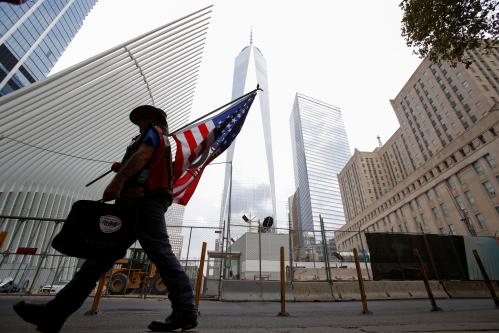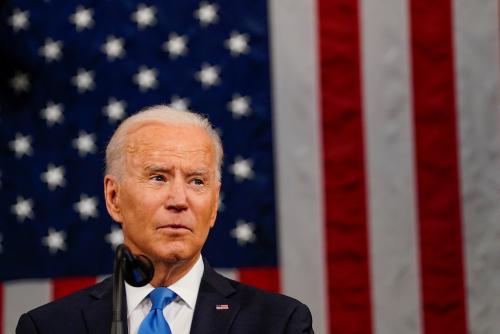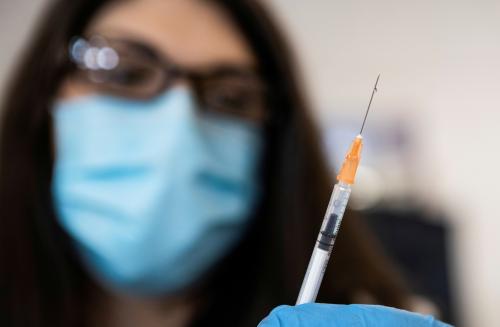In November 2018, Gavin Newsom won the race for the California governor with 62% of the vote, the highest share ever for a Democratic candidate. But by the summer of 2021, after a series of missteps, Newsom was in danger of losing a recall election that would have removed him from office. Polls showed a dead heat between supporters and opponents of the recall, a stunning development in one of the bluest states in the country.
Fast forward to Sept. 14, the day of the California election. Not long after the polls closed, it became clear that the opponents of the recall had won a sweeping victory and Gov. Newsom would remain in office. The next morning, with two-thirds of the votes counted, recall opponents led supporters by a margin of 64 to 36.
What happened? After a stumbling start, Newsom waged a strong campaign. He raised a lot of money, got President Biden and Vice President Harris to appear on his behalf, and turned the election into a head-to-head contest with Larry Elder, a conservative talk radio host who embraced Donald Trump and espoused positions on social issues that were out of step with the electorate. Under the bizarre recount laws, the voter gets to vote yes or no on the recall and then can immediately choose from a list of candidates. In this recent case, 46 candidates vied for the slot—none of whom were close to getting a majority of the voters.
Equally important, Newsom did not back away from the aggressive steps to battle the pandemic that had helped trigger the recall effort. Exit polls indicated that more than six in 10 Californians supported these measures. A strong plurality thought his overall approach was about right, with the remainder split between some who thought it was too strict and others that it was not strict enough.
On the other side of the country, meanwhile, the Republican governor of Florida, Ron DeSantis, who had emerged as the leading candidate for the 2024 Republican presidential nomination if Donald Trump decided not to run, found himself in trouble over his handling of the pandemic. For months, DeSantis had strongly opposed anti-COVID-19 mask and vaccine mandates and championed a libertarian view of individual freedom that resonated with his party’s base.
But when Florida’s infection rate surged in July and August, support for DeSantis’s approach to the pandemic waned, as did his overall standing with the electorate. A Morning Consult survey conducted in the last week of June showed that 54% of Florida’s registered voters approved of DeSantis’s performance as governor. When the survey was repeated at the end of August, his job approval had fallen to 48%. Tellingly, he lost ground mostly in the mobile center of the electorate, among Independents, whose approval fell 10 percentage points from 50 to 40%, moving DeSantis’s margin in this crucial group from +12 to -11. Several other polls have also shown support for DeSantis falling well below 50%, with his management of the pandemic in public schools a particular focus of disapproval.
A Republican consultant who had worked with the Florida governor spoke bluntly: “There’s no question [his handling of the pandemic] is impacting him politically. You can’t tout all the freedom and anti-lockdown you want. There’s no political strategy for sick kids and tired parents.”
Tellingly, recent polls show DeSantis trailing his two most likely opponents in Florida’s gubernatorial election next year. The former Republican governor and current Democratic Rep. Charlie Crist (D-Fla.) leads him 57 to 43 in a head-to-head contest, as does Agriculture Commissioner Nikki Fried by a margin of 54 to 46.
Much can change in the next year, of course, but as of now, there is compelling evidence that DeSantis’s unyielding approach to the pandemic is not resonating outside his Republican base.
These developments in California and Florida have national significance. When the pandemic began, Trump’s inaction highlighted the central role that governors would have to play. Now, the unwillingness of some governors to do what is needed to bring down soaring infection rates is forcing the federal government’s hand. Frustrated by the slow pace of vaccinations since mid-summer, the Biden administration has embraced mandates it previously resisted. The president is wagering that most of the public shares his frustration and is willing to support his new strategy. If the fate of Gavin Newsom and Ron DeSantis is a leading indicator (and a just-released poll suggests that it is), he may well win this bet.
The Brookings Institution is committed to quality, independence, and impact.
We are supported by a diverse array of funders. In line with our values and policies, each Brookings publication represents the sole views of its author(s).








Commentary
Pandemic Politics: Why Gavin Newsom beat the recall and Ron DeSantis is in trouble
September 16, 2021